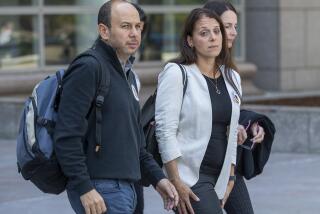U. S. Judge Punishes 2 Drug-Case Prosecutors
- Share via
A federal judge rebuked two U.S. prosecutors Tuesday and imposed a punishment of community service for violating his order to make crucial evidence in a drug case available to defense attorneys before the beginning of the trial.
U. S. District Judge J. Lawrence Irving expressed his displeasure at the government attorneys in no uncertain terms and said he would have dismissed the charges against the eight defendants if he felt that prosecutors had acted deliberately in withholding the information.
Instead, Irving ordered Assistant U. S. Atty. Edward Weiner and special Assistant U. S. Atty. Hugh McManus to perform community service supervised by federal probation officers. It was not clear what type of service Irving had in mind or if his order applies to both prosecutors or just one.
Second Setback
Tuesday’s action against Weiner and McManus, a county prosecutor on special assignment to the U. S. attorney’s office, was the second setback for both in a week. The two were the lead prosecutors in an 18-month investigation and prosecution of architect Paul Thoryk, who had been charged with tax fraud. Last week Irving dismissed the charges against Thoryk, ruling that there was insufficient evidence to bring him to trial.
Thoryk had been accused of laundering money for a drug ring headed by Manuel Battaglia, who is serving a 20-year prison term, and his brother, Jack. Weiner and McManus are prosecuting eight others allegedly involved in the Battaglia drug ring.
The trial for the eight defendants was scheduled for Nov. 29. In July, Irving ordered the prosecutors to make evidence and other information in the government’s possession available to defense attorneys between three and 15 days before trial. Irving’s order was issued in accordance with federal discovery rules covering evidence used by prosecutors in a trial.
But, on the day the trial was scheduled to start, defense attorneys, led by Eugene Iredale, told Irving that they could not proceed with their clients’ defense because the government had failed to abide by his discovery orders. The attorneys asked for a dismissal of the charges, and another hearing was set for Tuesday.
Items Covered by Order
Iredale said Irving’s order covered seven specific areas, including pretrial access to prosecution witnesses by defense attorneys, a list of government informants used in the case, and information about payments and other benefits given to them.
“They didn’t do any of this. . . . We sent them four letters before the trial asking them to comply with the discovery orders, but we didn’t get as much as a call back from a secretary,” Iredale said. “We told the judge that we were ready to go to trial, but we couldn’t because we were unprepared to give our clients the spirited defense that all defendants deserve.”
On Tuesday, the defense attorneys renewed their request for a dismissal of the charges based on the prosecutors’ failure to comply with Irving’s order, but the judge refused. Apparently, Ir ving was satisfied with the government’s explanation that failure to comply was an oversight.
According to Iredale, Weiner and McManus explained that they were overwhelmed by the Thoryk and Battaglia cases and were unable to make materials available to the defense in a timely manner.
Chief Assistant U. S. Atty. Nancy Worthington, who argued for Weiner and McManus’ defense, was unavailable for comment Tuesday.
“Miss Worthington was abjectly apologizing for the oversight and asked the judge not to throw out the case,” Iredale said. “But I said mea culpa (my fault) is not enough. Some of my clients have sat up there (on the witness stand) saying mea maxima culpa and they still go out the back door.”
Irving set a new trial date of March 7 for the eight defendants.
More to Read
Sign up for Essential California
The most important California stories and recommendations in your inbox every morning.
You may occasionally receive promotional content from the Los Angeles Times.













